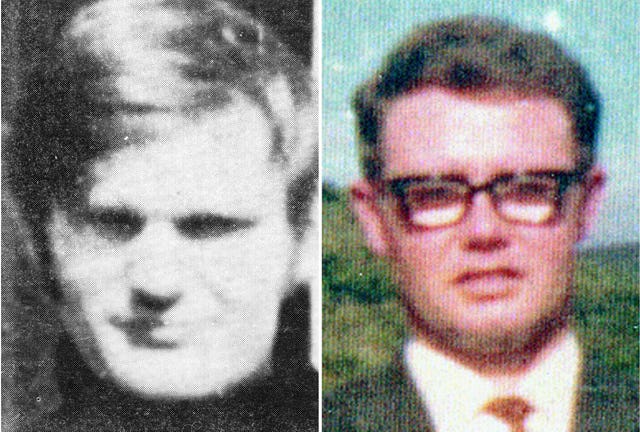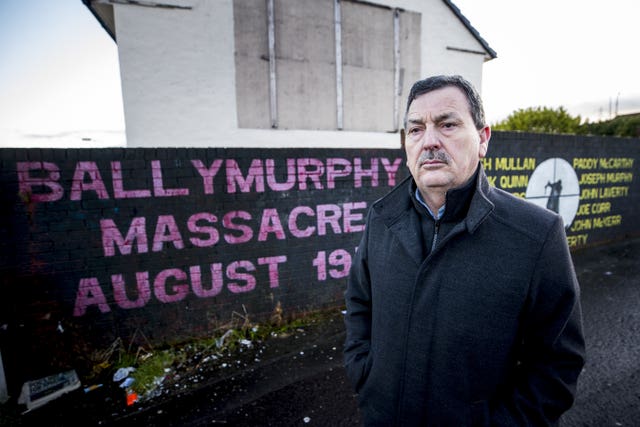The Secretary of State is to announce a way forward on dealing with Northern Ireland’s troubled past.
The approach, to be outlined by Brandon Lewis in the House of Commons on Wednesday afternoon, is expected to include a statute of limitations ending all prosecutions related to the Troubles before 1998.
Government sources have rejected claims this would effectively amount to an amnesty for both Army veterans as well as paramilitaries.
More than 3,500 people died during the conflict, which stretched from the early 1970s to the Good Friday/Belfast Agreement in 1998, while tens of thousands more were left injured.

Earlier this month, Northern Ireland’s Public Prosecution Service (PPS) announced their intention to withdraw proceedings against two former soldiers, Soldier F for the murder of two men during Bloody Sunday in 1972 and Soldier B for the murder of 15-year-old Daniel Hegarty six months later.
It followed a review of the cases by the Public Prosecution Service (PPS) in light of a recent court ruling that caused the collapse of another Troubles murder trial involving two military veterans.
The Crown cases against both Soldier F and Soldier B hinged on evidence of a similar nature to that which was ruled inadmissible in April’s trial of Soldier A and Soldier C for the 1972 murder of Official IRA leader Joe McCann in Belfast.
A legal challenge to the decision to withdraw proceedings against Soldier F is ongoing.
Last month Mr Lewis and Irish Foreign Affairs Minister Simon Coveney announced a new process by the two governments on legacy.
Families of victims, political parties and other stakeholders are to be involved.
Mr Lewis then said the process will “build on and develop on the principle of the Stormont House Agreement”.
In 2014, the Stormont House Agreement proposed a Historical Investigations Unit to examine unsolved murders during the Troubles and an Independent Commission on Information Retrieval for families to learn more about the fate of their loved ones.

The families of those killed by soldiers in west Belfast in 1971 have urged against a statute of limitations on Troubles prosecutions.
A fresh inquest into the deaths of a woman and nine men in Ballymurphy found they were “entirely innocent”.
“We see this as the British Government’s cynical attempt to bring in an amnesty and a plan to bury its war crimes,” the families said in a statement.
“The Ballymurphy Massacre inquest findings in May this year is the perfect example of why there should not be a statute of limitations.
“Justice Keegan confirmed what the Ballymurphy Massacre families always stated, that all those who lost their lives in the Ballymurphy Massacre were ‘entirely innocent of any wrongdoing’ and ‘posed no threat’.
“This is a war crime and those responsible must be held to account.”
Sandra Peake, chief executive of the Wave Trauma Centre, said a statute of limitation “removes the glimmer of hope” from victims seeking justice.
She described it as “unfair” that victims are hearing updates about the process of dealing with the past through the media.
“In this line of work we talk about having victim-centred care, this has been far from that,” she told the BBC.
“There is further information coming out (tomorrow), it’s important to see that. We believe that if a statute of limitation comes, it is a defacto amnesty.
“Many do not have expectations of prosecutions but they do have expectations around investigations, and I think that removing prosecutions, you remove that glimmer of hope. That’s what families have talked to me about, removing the glimmer of hope that somebody will be held to account and they think that that is what is so wrong. We cannot allow that to happen.”




Comments: Our rules
We want our comments to be a lively and valuable part of our community - a place where readers can debate and engage with the most important local issues. The ability to comment on our stories is a privilege, not a right, however, and that privilege may be withdrawn if it is abused or misused.
Please report any comments that break our rules.
Read the rules here